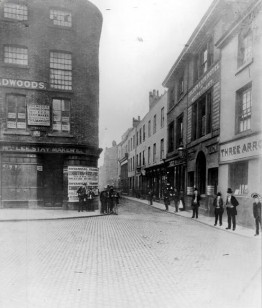Friedrich Engels lived in Manchester for more than 20 years, during that time receiving many visits from Karl Marx who was living in London. Engels led a double life as both manager of his father’s cotton factory and political radical, and the harsh conditions of workers in Mancunian industry formed a key influence on his ideas about society, which he first set down in The Condition of the Working Class in England in 1844.
The Golden Lion Hotel and Restaurant was located on Deansgate and was a favourite meeting place for Engels and fellow radical thinkers. In the title of this piece, it represents Manchester as a place for debate, radical politics and the exchange of ideas. Manchester’s pivotal role in the British Industrial Revolution led to its vital importance in the development of the trade unions movement, but as Engels’s presence here shows, the legacy of these politics was international and it was at Chetham’s Library that much of the thought behind the Manifesto of the Communist Party took place. What began with the technological advance that can be found in the hulking, innovative but undoubtedly dangerous, steel machinery now safely housed in the Museum of Science and Industry’s Power Hall became a catalyst for social change that would affect the course of world history for the century to come.
The Golden Lion Hotel, was written in response to a call for works responding to the exhibits of the Power Hall at Manchester’s Museum of Science and Industry to be performed at the ‘Engines of Invention’ showcase of works by postgraduate composers at the University of Manchester. It received its first performance at that concert on 26 April 2010 at the hands of percussionist and composer Steve Pycroft.
